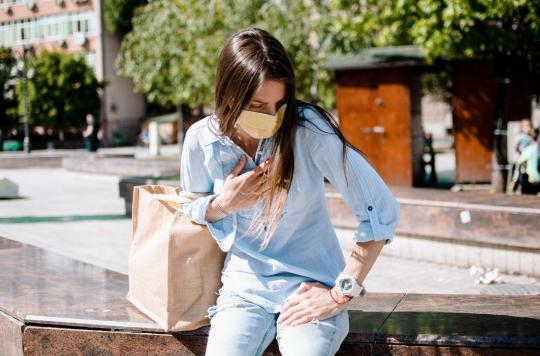The pulmonologist Didier Debieuvre, head of department at the Émile Muller hospital in Mulhouse, gives us his knowledge of the long-term consequences of Covid-19, and advises people who suffer from it.

Why doctor – Do you notice long-term pulmonary sequelae of Covid-19, and if so which ones?
Didier Debieuvre – Indeed, we observed medium- and long-term pulmonary sequelae of Covid-19, during the follow-up carried out at 3 and 6 months after the acute episode and discharge from hospital. There are changes towards pulmonary fibrosis, but especially ventilatory deficits, with patients who remain out of breath rapidly during exercise, and maladjustments to effort, with impaired pulmonary gas exchange*.
What are the evolutions of these sequelae?
At this time, we have not analyzed all the data from our SISCOVID follow-up study. The condition of patients generally tends to improve over time, but the persistence of very long-term sequelae (beyond one year) is unknown. Some patients take time to recover respiratoryly and require longer follow-up. The risk of permanent sequelae exists, with respiratory disability.
Are there profiles more concerned than others by long-term pulmonary sequelae?
During my consultations, I did not notice any particular profile of patients who had more pulmonary sequelae than others. There are people who are obese and who recover very quickly from Covid-19, and others who do not have a weight problem but yet persistent long-term breathing difficulties. However, the length of stay in intensive care is an indisputable risk factor for long-term respiratory and neuromuscular sequelae.
Are you discovering other types of long-term consequences left by Covid-19?
Absolutely. First there is muscle fatigue or weakness, which can persist for months when the respiratory function tests are strictly normal, and the walking test does not show any desaturation on effort. It often testifies to muscle wasting and a lack of adaptation to effort.
The loss and modification of taste and especially of smell also recur very often in my patients, sometimes with fluctuations over time. The sensation of smelling unpleasant odors has also been reported to me.
Regarding the persistent intellectual fog and memory loss, I have not seen patients who have spoken to me about it, but these sequelae have been noted by other colleagues.
Finally, psychologically, it is difficult, especially for those who are limited in their efforts and can no longer do the same activities as before.
Can everyone who has caught covid-19 have long-term consequences?
Yes, for example, we see patients who have been little affected by Covid-19, without a stay in intensive care or a need for oxygen, and who remain fatigable for a very long time after contracting Sars-CoV-2.
Are these sequelae disabling in everyday life?
It is disabling on a daily basis, especially fatigue, which sometimes prevents a return to work, especially in professions with physical efforts to be made.
What do you offer patients who suffer from long-term sequelae of Covid-19?
Pulmonologists offer them physical rehabilitation, with exercises led by physiotherapists and sports instructors, as well as psychological and nutritional care if necessary, because there is sometimes significant muscle wasting (sarcopenia).
What do you advise people who suffer from long-term sequelae of Covid-19?
They should not stay with their discomfort and be followed, either by their doctor or by a specialist. If, after eight weeks, fatigue, difficulty breathing or loss of memory, taste and smell persist, you should consult. Any shortness of breath that persists 3 months after Covid-19 infection should lead to a consultation with a pulmonologist for a respiratory evaluation.
Looking back, do you think that Covid-19 is essentially a respiratory disease?
Sars-CoV-2 is a respiratory-tropic virus, with an acute phase above all respiratory, and respiratory distress leading to death. Covid-19 is therefore indeed an infectious respiratory disease, with respiratory sequelae, but not only. They can also be muscular, neurological, cardiac, etc… and require investigations.
The new UK variant of the Sars-CoV-2 Are you worried?
This is worrying, because the information that comes to us from Great Britain says that this variant is much more contagious, and therefore that the transmission is more important than with the initial virus. There is therefore an increased risk of serious cases and saturation of hospitals, which must be countered with barrier gestures and vaccination, a priori effective against the British variant. Personally, I got vaccinated yesterday morning, even though I had Covid-19 in March. Caregivers, especially doctors, must be an example to help dispel conspirators and anti-vaccineers, and show the population the safety of this vaccine. Vaccination is the only way to quickly return to normal life without confinement or curfew.
We must remain vigilant with regard to what is happening in Great Britain, and not make the same mistake as during the first wave, where we remained for a long time without doing anything, thinking we were better than the Italians. We will probably not escape a new confinement.
* More results will be presented during the CPLF 2021.
.















